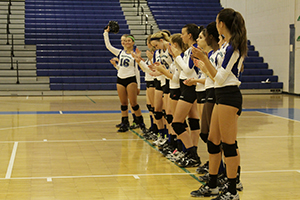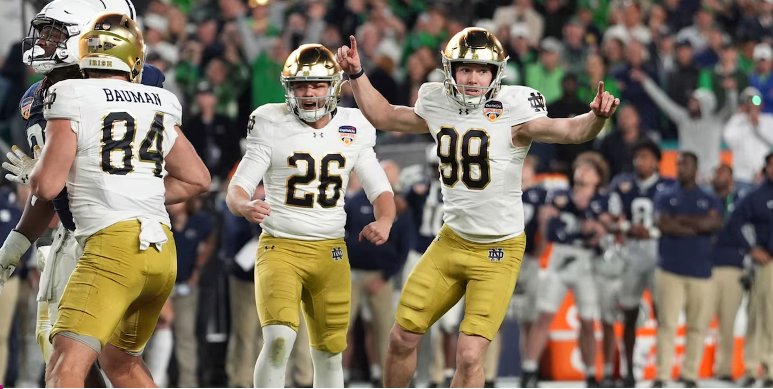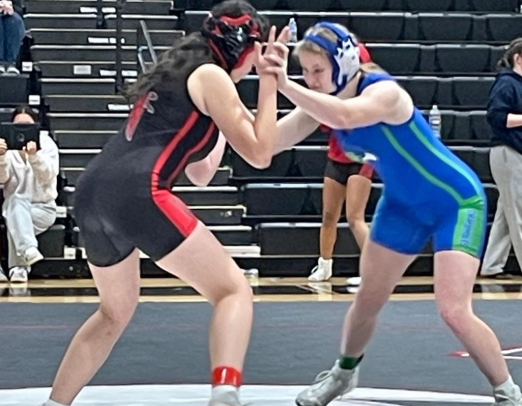The Centers for Disease Control recently claimed that concussions in sports occur at an “epidemic level.”
Concussions have affected sports at the professional level massively, with evidence that these injuries caused traumatic brain damage.
Such injuries have affected high school sports as well, causing long recovery time or even taking players out of the games they love permanently.
Varsity wrestler and junior Josh Forrest has suffered three concussions, his most serious occurring his sophomore year. Forrest remembers the initial blow.
“It was a normal quarterfinals match,” Forrest said. “I was wrestling against the number one seed and I had taken him to overtime. I got hit and was bleeding for ten minutes because I had a popped blood vessel in my eye.”
Forrest was disqualified from the match for concussion-like symptoms, as he was barely able to walk under his own power.
“I fainted when I got to the trainer’s room and could barely stand,” Forrest said. “I was dizzy and had massive headaches for two weeks after it happened. I had trouble walking too.”
It was not until two weeks after the initial hit that Forrest was formally diagnosed with a concussion.
“We didn’t know until 10 days later during another match I was wrestling in,” Forrest said. “I almost lost to a kid I would normally destroy and, after the match, I physically couldn’t push myself up from the mat.”
During his recovery, Forrest had to sit out and watch his team’s successes. He still experiences symptoms of his severe concussion.
“It was so hard not being able to compete,” Forrest said. “We won our first trophy in team history during those two months, and I was upset about not being able to contribute. Today, I still get symptoms and headaches even after being medically cleared to wrestle.”
According to the CDC, high school aged athletes, after suffering their first concussions, are three to six times more prone to more brain trauma in the future.
Senior Natalie Gauger, who played varsity softball till her junior year, suffered her fifth concussion-related injury during a game last year.
“I got my latest concussion last March when I was hit in the left temple by a softball,” Gauger said.
Her injury took her out of the game she had been playing since she was 14 years old, while also impeding her ability to come to school.
“I didn’t come to school for all of fourth quarter basically,” Gauger said. “I had severe headaches, was exhausted, and was very nauseous.”
For Gauger, the short increments of time between her concussions permanently took her out of the game.
“It is very emotional for me to not be able to play contact sports, but I understand that it’s for my safety. “I’ve been going to the gym to stay in shape. It didn’t really hit me that I wasn’t allowed to play until this upcoming season came closer.”
Gauger advises those who at risk for concussions to take necessary precautions.
“I would warn others to be cautious,” Gauger said. “Don’t underestimate concussion symptoms. Always go to the trainer if you are having problems.”
FCPS has completed research with many highly esteemed doctors to promote concussion safety.
“The FCPS Athletic Training Program has been involved with concussion research since the late 1990’s,” FCPS Athletic Training Program administrator Jon Almquist said. “By being involved in the early stages of sports concussion research, we ended up interacting with many other national leaders in concussion research throughout the nation.”
The force of a blow to the head causes the brain to actually shift within a person’s skull, resulting in a concussion in which abilities are impaired.
FCPS has been a pioneer in concussion safety, which Almquist attributes to one key word: education.
“While most athletic trainers may attend continuing education seminars or meetings regarding concussion one or two times a year, the athletic trainers in FCPS discuss this topic as a group about every two weeks,” Almquist said. “Not only are they up to date on current literature on concussions, we tend to be up to date about a year before it even is available to the public.”
In addition to county guidelines, VHSL has implemented a state-wide policy requiring all high school athletes and one parent to complete a concussion education program.
The program covers short and long term concussions and the necessary measures that should not be ignored.
To learn more information about the VHSL program click here and follow the link for students.














